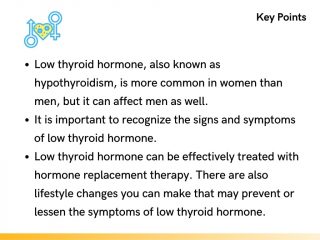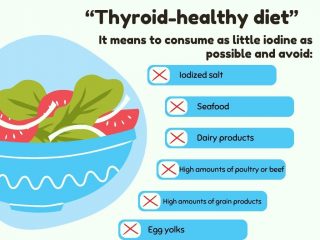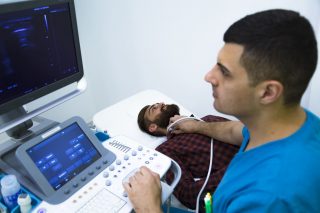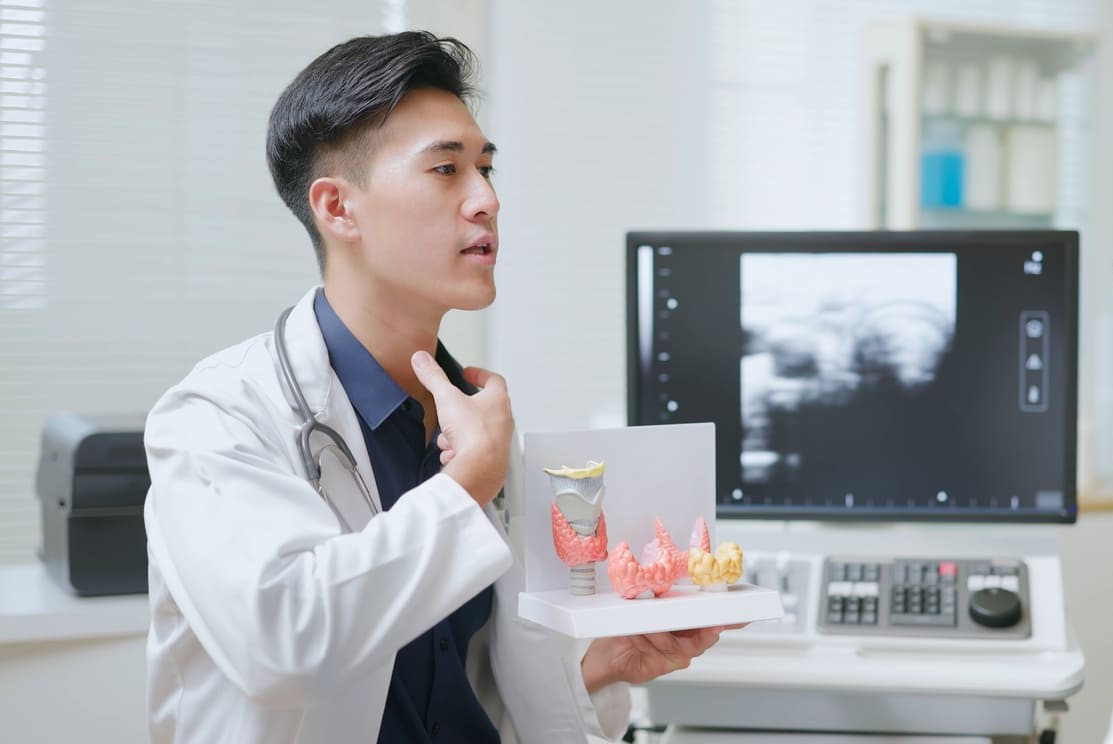 It is important to learn how to recognize the symptoms of low thyroid hormone.
It is important to learn how to recognize the symptoms of low thyroid hormone.
The thyroid is a small, butterfly-shaped gland located in the neck. The thyroid produces two different “thyroid hormones,” both of which regulate a number of bodily functions from metabolism to the beating of your heart.
Low levels of thyroid hormone (hypothyroidism) is a hormonal imbalance that occurs when your thyroid gland does not produce enough thyroid hormone. It is the most common thyroid disorder.
Symptoms of low thyroid hormone range from mild to severe. Low thyroid hormone is more common in women than men, but it can affect men as well. Low thyroid hormone can be effectively treated with hormone replacement therapy. There are also dietary and other lifestyle changes you can make that may prevent or lessen the symptoms of low thyroid hormone.
The most common cause of low thyroid hormone is an autoimmune disorder known as Hashimoto’s Disease. “Autoimmune” conditions are those in which your body’s own immune system turns on itself. In the case of Hashimoto’s, your immune system makes antibodies that cause white blood cells to attack and damage the thyroid gland and its ability to make thyroid hormones. This is known as “primary hypothyroidism.”
Sometimes, hypothyroidism can occur after treatment for an overactive thyroid gland. That may include radioactive iodine therapy or surgery. Low thyroid hormone can also develop shortly after pregnancy. These are causes of “secondary hypothyroidism.”
How to Recognize and Prevent the Symptoms of Low Thyroid Hormone
Like many other hormone imbalances, the signs and symptoms of low thyroid hormone range from minor to more serious; some can even be life-threatening. The most common symptoms include cold intolerance, fatigue, weight gain, dry skin and hair, and mood or emotional changes.
Overview of Common Symptoms
It is important to learn even the most subtle symptoms of low thyroid hormones so that you can recognize the signs that indicate you may need hormone replacement therapy.
Physical Symptoms
- Fatigue and Weakness – The thyroid plays a major role in metabolism, or how your body converts calories into energy or stores them as fat. Since hypothyroidism slows your metabolism, fatigue and lack of energy are one of the most common physical symptoms of low thyroid hormone.
- Unexplained Weight Gain – The slower metabolism caused by low thyroid hormone can also result in weight gain or obesity.
- Dry Skin and Hair – Hypothyroidism impacts the sweat glands. Sweating less not only impacts your temperature tolerance but can also cause your skin to become dry and thick. Low thyroid hormone can also cause hair to become coarse, eyebrows may become more sparse, and nails may become brittle.
Mental and Emotional Symptoms
Thyroid hormones are intricately linked to “brain chemicals” such as serotonin that influence mood. Studies have shown that low thyroid hormone negatively influences what is known as the hypothalamus-pituitary-thyroid axis, which can lead to decreased levels of neurotransmitters, which can lead to:
- Depression and Anxiety
- Memory Issues
- Mood Swings
Subtle Indicators of Low Thyroid Hormone Levels
Some of the signs or symptoms of an underactive thyroid can be vague or subtle or overlap with other conditions, causing them to be overlooked. It is important to recognize these as well because the impact of undiagnosed hyperthyroidism can put you at risk for some serious conditions, such as cardiovascular disease, osteoporosis, or a rare, life-threatening condition known as Myxedema coma.
- Changes in Appetite – Low thyroid hormone can cause changes in appetite and other gastrointestinal disorders such as constipation
- Sensitivity to Cold – As mentioned above, an underactive thyroid slows your metabolism. A slowed metabolism can cause a drop in core body temperature. As such, people with low levels of thyroid hormones tend to feel cold all the time or have a low tolerance to the cold.
- Menstrual Irregularities (for females) – Almost all of the symptoms of low thyroid hormone overlap between men and women; however, there are some gender-specific symptoms, such as irregular periods in females.
Lifestyle Modifications for Thyroid Health
There are several lifestyle changes you should make if you are concerned about low thyroid hormone. One of the most important lifestyle changes you can make is to quit smoking. Smoking cessation is good for any number of reasons, but cigarette smoke is known to contain several toxins that can hurt your thyroid, and since the thyroid is physically located in your throat, it is bathed in these toxins when you smoke.
There are also dietary considerations that impact thyroid function, and you should also learn how to do a thyroid self “neck check,” get regular exercise and see your doctor for regular checkups.
Balanced Diet for Thyroid Function
One way to manage thyroid issues is to eat a “thyroid-healthy diet.” According to the American Thyroid Association, that means to consume as little iodine as possible. 
Men, in particular, who are concerned about thyroid disease are advised to avoid soy products such as tofu, soy milk, soy sauce, and soybeans. A 2006 study published in the journal Thyroid suggested that soy can interfere with healthy thyroid function.
Supplementation with the mineral selenium has also been suggested as a way to promote normal thyroid function.
Regular Exercise and Its Impact
Regular exercise can help people with low thyroid hormone in many ways. Exercise can raise your metabolism as well as increase the level of endorphins and other feel-good brain chemicals that can help counter the mood issues caused by low thyroid hormones.
Stress Management Techniques
Like all hormones, thyroid hormones must work in harmony and balance with all other hormones. Stress may not directly cause thyroid issues, but the release of stress hormones, like cortisol, can throw off the delicate balance of all your hormones, including your thyroid hormones, potentially leading to thyroid disease.
Importance of Consultation
If you suspect that you are experiencing the symptoms of low thyroid hormone, it is urgent that you seek professional advice to learn more about how hormones impact your overall health and well-being.

Do not panic if you have been given a diagnosis of hypothyroidism. Low thyroid hormone is a quite common condition affecting one in 300 people in the United States. There are effective treatments available for hypothyroidism, and that is why consultation with a medical professional is so important. If you are diagnosed with hypothyroidism, in addition to prescribing thyroid hormone replacement therapy, your doctor will likely also suggest lifestyle modifications such as dietary changes and new exercise regimens.
Thyroid Function Tests
Specific tests are required to diagnose thyroid issues like low thyroid hormones. If you are experiencing any of the symptoms listed above, it is imperative that you see your primary care physician to be screened for a thyroid problem. To diagnose thyroid disease, doctors will typically do a physical exam, including an examination of the neck area and blood tests. Your doctor may also use imaging techniques to get a better idea of what’s going on with your thyroid gland.
Medical Treatment for Hypothyroidism
The thyroid makes two thyroid hormones, T-3 and T-4. The goal of medical treatment for low thyroid hormone is to bring your levels of both of these hormones back into the normal range. Hypothyroidism is treated with hormone replacement therapy, typically a synthetic hormone called Synthroid or the generic levothyroxine. The drug is quite effective; however, most patients being treated for hypothyroidism will need to keep taking levothyroxine for the rest of their lives.
Initially, you will be prescribed the lowest dose possible that relieves your symptoms and brings your blood thyroid hormone levels back to normal. Over the course of taking levothyroxine, you will be monitored and retested, and your dose will be adjusted as necessary.
An unusual-sounding but successful alternative treatment for the symptoms of low thyroid hormones are drugs made from pig thyroids known as desiccated thyroid extracts (DTE). These drugs, such as Armour Thyroid and WP Thyroid, have been around for many years and are prescribed by naturopathic physicians and other alternative practitioners as a substitute to hormone replacement therapy for underactive thyroid.
Conclusion
Low thyroid hormone is a common yet quite treatable hormone imbalance. Learning to recognize the symptoms of hypothyroidism can lead to early diagnosis and effective treatment, leading to a return to hormonal harmony and optimal health.

